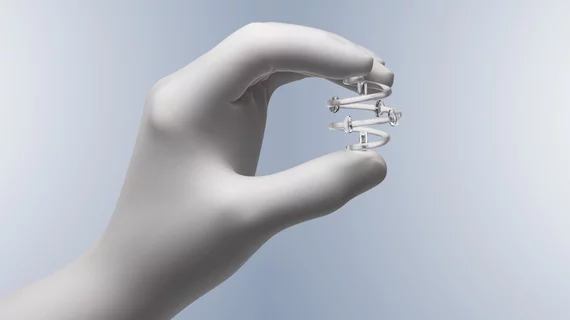Hologic recalling breast care device after 252 injuries, slew of patient lawsuits
Mammography vendor Hologic is pulling certain breast care devices from shelves after 252 reported injuries, the U.S. Food and Drug Administration said Wednesday. Meanwhile, over 100 patients are now suing the Marlborough, Massachusetts-based company over the alleged incidents.
The alert pertains to the BioZorb and BioZorb LP markers, implanted in soft tissue to indicate the site for radiographic procedures. FDA authorities have received reports of injuries including discomfort from feeling the marker in the breast, infection, pain, rash, fluid buildup and other complications.
Federal authorities previously issued a safety alert about the product in October, with the new update adding 64 additional injuries in the two months since. This is a Class 1 recall, the FDA’s most severe designation, indicating use of the BioZorb can cause “serious injury or death if you continue to use it” (though there have been zero reported fatalities). Hologic is now removing the devices from where they are used or sold, according to the update.
“Be aware the FDA has not cleared or approved the use of BioZorb Markers to fill space in the tissue or to improve cosmetic outcomes after procedures, or as a marker for radiation treatment,” the agency said, adding that radiologists and radiation oncologists should “report any problems, complaints or complications experienced by patients.”
Physicians also should stop using the markers and monitor patients who still have them implanted. Facilities, meanwhile, must quarantine all products and notify surgeons about the recall, according to the FDA.
Multiple lawsuits
Multiple individuals have filed lawsuits against Hologic over the BioZorb issue. The device (previously made by Focal Therapeutics) is an implantable radiographic marker used to tag the breast or other soft tissue for future procedures. BioZorbs are typically implanted with six titanium radiopaque marker clips that serve as “targets” for radiation therapy. The spacer material is supposed to be resorbed by the body, leaving the clips as permanent indicators of soft tissue sites.
Mindy Holcomb was diagnosed with breast cancer around June 2021, undergoing a lumpectomy and partial mastectomy of her left breast two months later at UAMS Medical Center in Little Rock, Arkansas. Surgical oncologist Ronda S. Henry-Tillman, MD, properly implanted a BioZorb in the woman at the time, according to one complaint filed Nov. 4.
However, the device allegedly migrated in her breast, causing pain and swelling. Holcomb later underwent a double mastectomy, with Dr. Henry-Tillman removing the device, but the problems persisted.
“As a result of the BioZorb implant, [Holcomb] has been caused to have significant pain, disfigurement, and worry, leaving her permanently and physically scarred,” the complaint states. “Plaintiff’s complications, adverse local tissue reaction, disfigurement, nonabsorption, device migration, and palpable mass are not warned of on the instructions for use but were risks [Hologic] knew, or should have known, and failed to disclose to physicians and patients.”
Holcomb and her attorneys are seeking damages in excess of $75,000, with the exact amount to be determined by a jury trial. Laura Nudel of Pennsylvania is seeking the same and also is represented by law firm Ketterer, Browne & Associates, according to a separate complaint filed Sept. 30. Nudel was similarly diagnosed with breast cancer in 2021, underwent a left-breast lumpectomy, and had a BioZorb implanted by surgeon Lisa K. Torp, MD, at UPMC Harrisburg, Pennsylvania.
She allegedly suffered from a hardened mass and scar tissue near the surgery site and can “feel” what she believes is the nonabsorbed device in her breast.
“She has had severe pain, reddening, and a hot/burning sensation in her breast tissue over the past year and a half, and she cannot push, pull, pick up objects, or even move without pain, which radiates throughout her left breast,” the lawsuit claims. “Additionally, as a result of the pain, complications, and hardened mass from the BioZorb device, [Nudel] fears the possibility of another tumor, causing her significant emotional distress.”
Multiple Kentucky women also filed a third complaint in July, and there are further lawsuits as far back as two years ago, according to federal court records.
Hologic did not immediately respond to Radiology Business requests for comment Wednesday. In the company’s annual report filed with the Securities Exchange Commission, Hologic noted that it has faced lawsuits stemming from the BioZorb product dating back to November 2022. It estimated that the collection of complaints now represents about 100 plaintiffs, with one case pending in Massachusetts State Court and the rest in U.S. District Court.
“Discovery is ongoing,” the SEC filing states. “While [Hologic] believes it has valid defenses and plans to vigorously defend its position, litigation can be costly and unpredictable, and at this early stage the company cannot reasonably assess the outcome of this matter.
Hologic first acquired Focal Therapeutics and the BioZorb product line for $125 million in 2018. In the same filing, the company said it recently conducted an analysis of its cash flows and found that revenue generated from the product is insufficient to cover the carrying value of the acquisition on its balance sheet. With the fair value of the BioZorb asset below its carrying value, Hologic recorded an impairment charge of $13.3 million to “developed technology” and fully wrote-off the asset, according to the regulatory filing.
UPDATE: Hologic responded to our inquiry late Wednesday, sharing the same statement from October:
“After careful consideration, Hologic has made the decision to stop manufacturing BioZorb and is voluntarily removing all unused BioZorb markers from the market. We have communicated directly with our customers to inform them of this decision, and we have been coordinating closely with the FDA to ensure that healthcare providers and patients have the most up-to-date information. We are committed to providing high-quality products that enable safe, effective care and will continue to support our customers as they transition to alternative solutions.”

